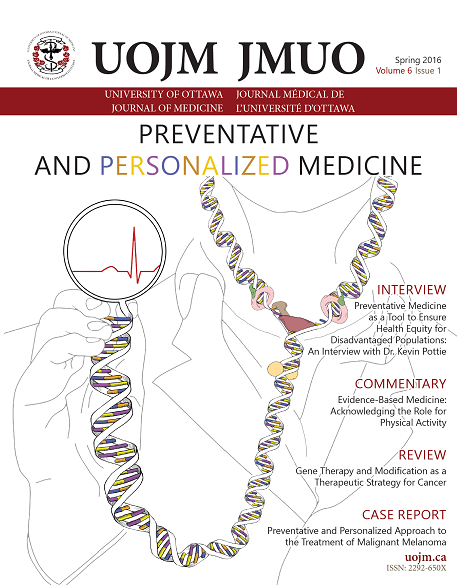Doctor Jérôme Lejeune’s Gaze at the University of Ottawa
DOI :
https://doi.org/10.18192/uojm.v6i1.1590Mots-clés :
genetic medicine, advocacyRésumé
From January 29th to February 1st, 2015, a group of University of Ottawa undergraduate students and I hosted an exhibit about the life and research of French physician Dr. Jérôme Lejeune, who in 1959 discovered Trisomy 21, the genetic origin of Down syndrome (DS). Considered the father of modern genetics, Dr. Lejeune believed medicine should serve the patient and not the disease. The exhibit focused on Lejeune’s profound humanity and compassion that accompanied his commitment to scientific truth. It also showed how this great scientist maintained an unshakeable adherence to his faith and conscience despite challenges and adversity.
Du 29 janvier au 1er février 2015, un groupe d’étudiants au premier cycle universitaire ont organisé une exposition portant sur la vie et les travaux de recherche du médecin français Dr Jérôme Lejeune, qui en 1959 a découvert la trisomie 21, l’origine génétique du syndrome de Down. Dr Lejeune est considéré comme le père de la génétique moderne. Il croyait que la médecine devait se concentrer sur le patient et non seulement sur sa maladie. L’exposition a mis en valeur l’humanité et la compassion du Dr Lejeune en illustrant comment ce grand scientifique a su maintenir sa foi et ses croyances malgré les défis à relever.
Références
2. Lejeune J, Gauthier M, Turpin R. Les chromosomes humains en culture de tissus. CR Hebd Seances Acad Sci. 1959; 248(4):602–603.
3. Lejeune J, Lafourcade J, Berger R, et al. Trois cas de délétion partielle du bras court d’un chromosome 5. CR Hebd Seances Acad Sci. 1963;257:3098–3102.
4. Lejeune J. The William Allan Memorial Award lecture. On the nature of men. Am J Hum Genet. 1970;22(2):121–128.
5. Jerome Lejeune Foundation USA. Legendary Geneticist Jerome Lejeune [Internet]. Ottawa (ON): University of Ottawa, Department of Medicine; 2013 July 29. Available from: https://www.youtube.com/ watch?v=0MA42QKsEWQ.
6. Lejeune J. 21 Thoughts [Internet]. Ottawa (ON): University of Ottawa, Department of Medicine; 2013. Available from: http://lejeuneusa.org/ advocacy/21-thoughts-dr-jérôme-lejeune.
7. Caplan L. Edmund Pellegrino [Internet]. Ottawa (ON): University of Otta¬wa, Department of Medicine; 1986 April 27. Available from: https://www. washingtonpost.com/archive/lifestyle/magazine/1986/04/27/edmund-pellegrino/334406d8-cf5a-4349-8655-0cdbf656f6f3/.
8. Israël L, Arnaldez R. Notice sur la vie et les travaux de Jérôme Lejeune (1926- 1994): séance du mardi 4 mars 1997. Académie des sciences morales et politiques (France), Paris, France, 1997.
9. Strippoli P, Pelleri MC, Caracausi M, et al. An integrated route to identifying new pathogenesis-based therapeutic approaches for trisomy 21 (Down Syndrome) following the thought of Jérôme Lejeune. Sci Postprint. 2013;1(1):e00010.
Téléchargements
Publié-e
Numéro
Rubrique
Licence
- Les auteurs qui publient dans le JMUO gardent les droits d’auteur de leurs articles, incluant tous les brouillons et la copie finale publiée dans le journal
- Bien que le JMUO n’a pas les droits d’auteur des articles soumis, en acceptant de publier dans le JMUO, les auteurs donnent le droit au journal d’être les premiers à publier et à distribuer leurs articles.
- Par la suite, les auteurs peuvent soumettre leurs documents à d’autres publications, incluant des revues ou des livres, avec un remerciement de leur première publication dans le JMUO
- Des copies du JMUO seront distribuées à la fois sous format papier et en ligne, et tous les matériaux seront accessibles au public en ligne. Le journal n’a pas de responsabilité légale par rapport à la distribution publique du contenu.
- Prière de vous assurer que tous les auteurs, les coauteurs et les investigateurs
- Le contenu est rendu disponible sous licence Creative Commons Attribution - Pas d'Utilisation Commerciale - Pas de Modification 4.0 International.


